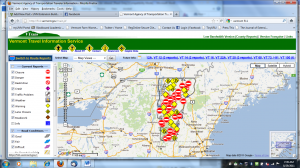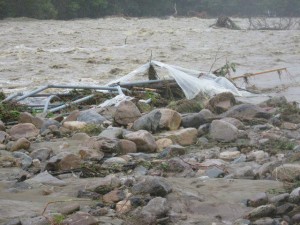In light of the devastating damage from Tropical Storm Irene over the weekend we are posting these tips for those affected…
[Adapted with permission from Phyllis Onstad, University of Minnesota Extension]
A natural disaster can strike anywhere at any time, leaving in its wake damage and destruction that affects the financial well-being of survivors. You may be in disbelief, yet anxious to start to put the pieces back together. You may not be able to return to your property until it is declared safe, but you can take steps toward financial recovery.
Here are actions to take, depending on your situation, suggested by Community Development specialists at UVM Extension.
- Notify your homeowners, flood, or rental insurance company of the loss. Tell them how to best contact you for claims service. Report the loss even if you doubt the loss will be covered. If you lost your insurance policy, request a copy.
- If you have no place to stay and the shelter is full, you may be able to receive a voucher for a hotel room from the local American Red Cross or Salvation Army. If you have home owners or renters insurance, determine if you have coverage for temporary housing.
- When feasible; contact employers to inform them of your situation and determine time you may take off of work, if needed. Let your employer know how to best contact you.
- If an employer notifies you that your place of employment was severely damaged or destroyed and you cannot work; contact your state’s unemployment insurance office. Ask about eligibility for unemployment benefits.
- If injured or disabled, you may be eligible for disability insurance; contact your agent.
- If you have natural gas service; call the natural gas company for a safety inspection before entering the home, or request a natural gas shut off for safety purposes. Cancel the account until gas is needed.
- If the electrical service is unsafe, do not enter. Call the electrical company to disconnect service until repairs can be made and electricity is needed.
 When authorities have determined that it’s safe to re-enter your property, assess damages and begin next steps. Document what you have done, with whom you have spoken, actions to take, contact information, deadlines for disaster assistance applications and appointments.
When authorities have determined that it’s safe to re-enter your property, assess damages and begin next steps. Document what you have done, with whom you have spoken, actions to take, contact information, deadlines for disaster assistance applications and appointments.
- Determine if there are other services to cancel for a period of time, such as phone, softener salt delivery, cable television.
- If you are going to be out of your home or rental unit, provide a change of address to your post office. This will ensure that mail continues to be delivered to you.
- Notify your home mortgage company or your landlord of disaster damage to the property. Tell them how to best contact you. If you have lost your rental or mortgage agreement, request a copy.
- If you have vehicle damage or loss, contact your auto insurance agent. Find out how long it will take to process your claim. Ask if you have coverage for car rental. Let the agent know how to best contact you. Request a copy of your policy if missing.
- Do not sign anything from insurance companies indicating that this is a final interaction/payment to you, as other disaster-related damages may surface weeks and months from now.
- If you anticipate having difficulty paying bills, call your creditors and explain the disaster loss. Arrange payment plans before you get an overdue notice.
- Documentation will be required for property loss claims on homeowners and renters insurance, to submit uncovered property losses for income tax purposes, and to verify the need for assistance programs. Documentation should include: manufacturer, model, serial number, age, value new, approximate current value and damage incurred.
- Keep receipts and record all expenses related to recovery or rebuild efforts. They may be covered by insurance, assistance programs or deductible on taxes. Remember receipts for lodging, clean-up supplies, eyeglasses replacement and doctor bills related to disaster injury.
Find more educational disaster recovery information on Extension’s website at http://www.uvm.edu/extension
Tags: 2011 Flood, Irene, Natural Disaster, planning

